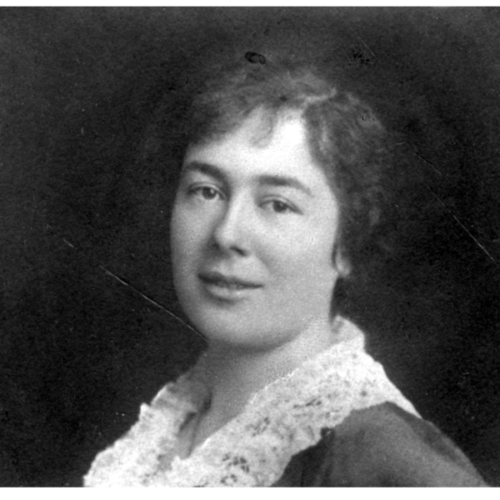
Zofia Kossak Szczucka was a Polish novelist who overcame her own antisemitism to save thousands of Jews from Nazi death camps.
Born in Kosmin, Poland in 1889 to an illustrious family of artists and writers, Zofia became a writer as well and penned a series of historical novels in the 1920’s and 30’s. The books covered a range of time periods and locations, and included a book about the Russian Revolution of 1917 and one about the Crusades. A devout Catholic, many of her books had religious themes and she wrote extensively for the Catholic press. Zofia married Stefan Szczucki, but he died young, and she remarried Zygmunt Szatkowski. Together they had one daughter, Anna.
After Germany invaded Poland in 1939, Zofia edited the underground newspaper Polska Zyje (Poland Lives.) In 1941, she co-founded the Catholic organization Front Odrodzenia Polski (Front for the Rebirth of Poland) and edited its newspaper Prawda (The Truth). To protect herself, she adopted the code name “Weronika.”
In 1940, the occupying Germans forced the Jews of Warsaw into a squalid, overcrowded ghetto. After a visit to the ghetto, Zofia was shocked, and felt a duty to tell the world what she had seen. She wrote a leaflet called “Protest” and printed 5000 copies for wide distribution. In the pamphlet, she described the horrific conditions in the ghetto, as well as the deportations of residents to death camps, starting in 1942. Zofia wrote of the Warsaw ghetto inhabitants, “All will perish… Poor and rich, old, women, men, youngsters, infants…. Their only guilt is that they were born into the Jewish nation condemned to extermination by Hitler.”
Surprisingly, when the war began, Zofia had no affection for the Jewish community in Poland, and openly described her own anti-Semitism in “Protest.” She wrote, “Our feelings toward Jews have not changed. We do not stop thinking of them as political, economic, and ideological enemies of Poland.” However, she said, “We are required by God to protest, God who forbids us to kill. We are required by our Christian consciousness. Every human being has the right to be loved by his fellow men. The blood of the defenseless cries to heaven for revenge. Those who oppose our protest are not Catholics.”
Either her personal beliefs towards Jews changed, or she put those prejudices aside in the interest of justice, because in 1942 she co-founded the Provisional Committee to Aid Jews, also known as Zegota. The organization was created to save Jews from death camps and contained one hundred secret cells that provided food, medicine, cash, and false IDs to thousands of Jews in Warsaw, as well as many in Krakow and Vilna. It is estimated that members of Zegota forged over 50,000 documents, including marriage, birth, and death certificates, as well as baptismal records to “prove” that people suspected of being Jews were actually Christians. Zofia and other Zegota volunteers also cared for over 3000 Jews in hiding in Warsaw.
Zofia repeatedly petitioned the Polish Government-in-Exile to appeal to the Polish people to help Jews. Indeed, the exiled government provided significant funding for Zegota until the end of the war.
Zofia was well aware that her underground activities saving Jews was likely to get her killed. According to noted historian Richard Lukas, “The number of Poles who perished at the hands of the Germans for aiding Jews” may have been as high as 50,000 (!)
In 1943, Zofia was arrested by the Gestapo and transported to Auschwitz. Fortunately, she survived until liberation in 1945. She returned home and continued writing books, including From the Abyss, about her experiences at Auschwitz, and The Covenant, about Jewish patriarch Abraham. Zofia also published numerous books for children and young adults.
After the war, a communist government was installed in Poland. The new Minister of the Interior, Jakub Berman, was Jewish. Grateful to Zofia for her heroic actions on behalf of his people, and knowing that as a Catholic activist she would be targeted by the new government, he urged her to leave Poland. Zofia followed his advice, but returned to her homeland in 1957.
Zofia Kossak Szczucka died in Poland in 1968. She was survived by her daughter Anna, also a Polish resistance fighter, who wrote a book about her experiences during the war. Three years after Zofia’s death, a memorial plaque was placed on the outside of her spiritual home, All Saints Parish Church. The plaque reads, “To Zofia Kossak, the renowned Polish Catholic writer, a woman of great generosity and courage.”
In 1982, she was posthumously honored as Righteous Among the Nations by Israeli Holocaust Memorial Yad Vahem. The National Bank of Poland issued a coin in 2009 honoring Zofia and two other heroes of the Holocaust, Irena Sendler and Matylda Getter. In 2018, Zofia was awarded the highest civilian honor, the Order of the White Eagle.
For overcoming her own prejudice and saving Jewish lives, we honor Zofia Kossak Szczucka as this week’s Thursday Hero.
Get the best of Accidental Talmudist in your inbox: sign up for our weekly newsletter.